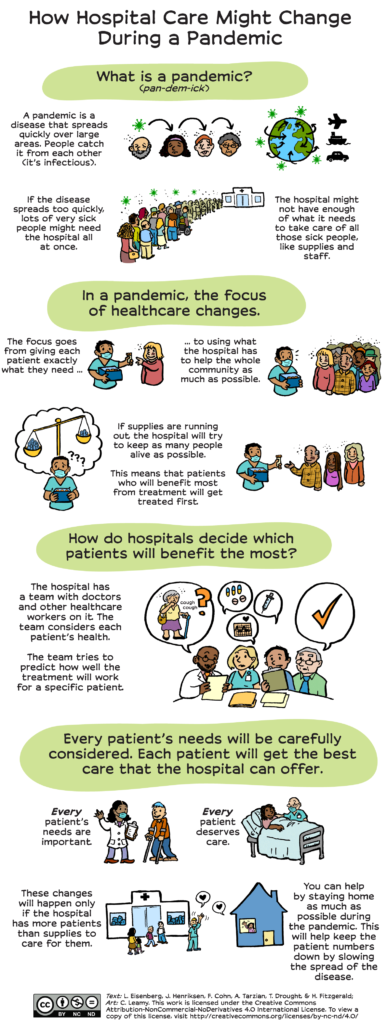by Leah R. Eisenberg, Joan M. Henriksen, Felicia G. Cohn, Anita J. Tarzian, Theresa S. Drought, Heather Fitzgerald.
Art by Cathy Leamy

Ethics and its implications for healthcare delivery under constraints of scarcity are not simple concepts, even for those working within the healthcare system. It’s time for ethicists to make a concerted effort to communicate these concepts to a broader public audience. Pandemic triage protocols call for transparency, because it leads to understanding and in this way increases the trust patients and families have in the healthcare system This commitment to transparency requires an explanation of how hospital care might differ during a pandemic. Understanding that the hospital has a plan may reduce fear that allocation decisions are made unfairly. Toward that end, six clinical ethicists from different disciplines and areas of the country, along with an illustrator with a master’s degree in Health Communication, worked together to create an illustrated handout to explain basic concepts of public health ethics relevant in a pandemic.
More than half of American adults – approximately 90 million people – have less than proficient levels of health literacy. Health literacy refers to a patient’s ability to obtain, process, and understand basic health information and services needed to make appropriate health decisions. This ability is further reduced during times of stress and illness, such as when someone seeks care for possible COVID-19. The use of illustrations for health instructions has been shown to increase patient engagement with and recollection of the information presented (Houts et al., 2006). Informational comics have been used to improve science scores among non-science major college students, and also to boost the comprehension of emergency department discharge instructions. For these reasons, we decided a comic would make a good vehicle for quickly informing patients and family members about the concept of scarce resource allocation during a pandemic.
The initial list of the ethically-relevant concepts we hoped to include in the comic was pages long, ranging from obligations hospitals owe physicians, to rights of disabled patients, to reasons for visitor restrictions. We decided to start with the foundational concept of triage. Clearly and accurately explaining that concept was in some ways more complex than penning a 3000 word journal article. Once the text and graphics came together, we received multiple rounds of invaluable feedback from representatives of the public, a patient and family advisory board from one of our institutions, and persons with expertise in disability rights advocacy.
We encourage everyone reading this to freely share this comic with patients and their family members during the COVID-19 pandemic. Uncertainty regarding when and how resources are allocated may cause anxiety for patients and families. Reducing that anxiety improves individual well-being and can help build trust in the health care system, which is so essential in times like these. In addition to informing individuals at the hospital, the comic could be used within communities as a springboard for discussion. The pandemic is placing us all on new footing. We hope this resource will improve communication and understanding among hospital teams, patients, and community members. We welcome feedback about your experiences using the comic so we can improve future efforts.
Download a free PDF image of this image. Leamy Covid Triage Comic in Color. Leamy Covid Traige Comic in BW